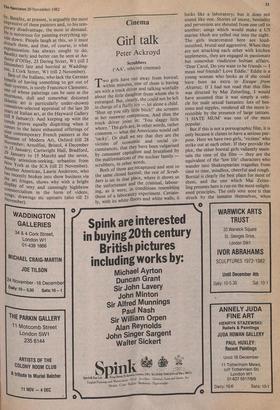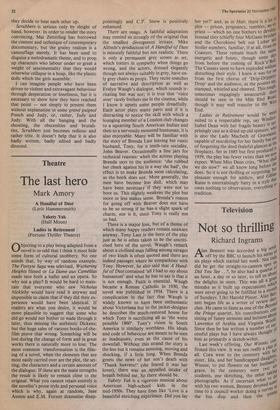Cinema
Girl talk
Peter Ackroyd
Scrubbers
(`AA', selected cinemas)
Two girls have run away from borstal; within minutes, one of them is having sex with a truck driver and talking wistfully about the little daughter from whom she is estranged. But, clearly, she could not be left in charge of a fluffy toy — let alone a child. `Shut up you silly little bitch!' she screams at her runaway companion. And then the truck driver joins in: 'You slaggy little whore.' The girls are, in other words, rather common — what the Americans would call `tacky'. Or shall we say that they are the victims of economic and social cir- cumstances, that they have been vulgarised by consumer capitalism and brutalised by the malformations of the nuclear family scrubbers, in other words.
Both of them are recaptured and sent to ; the rest of Scrub the same closed borstal
Scrub-
bers is set in that place, where it shows us the unfortunate and the criminal, labour- in conditions resembling ing, as it were,
those of a laboratory experiment. Certain- ly, with its white floors and white walls, it looks like a laboratory; but it does not sound like one. Stories of incest, bestiality and perversion are shouted from one cell to another; songs which would make a US marine blush are yelled out into the night. The girls incarcerated here are loud- mouthed, brutal and aggressive. When they are not attacking each other with kitchen implements, they are engaged in passionate but somewhat vindictive lesbian affairs. `Dear Carol, Do you want to be friends — I mean real friends? Love Eddie.' Eddie is a young woman who looks as if she could have been an extra in Escape from Alcatraz. If I had not read that this film was directed by Mai Zetterling, I would have assumed that it was simply a vehi- cle for male sexual fantasies: lots of bot- toms and nipples, rendered all the more ir- resistible by the presence of large tattoos. `I HATE MUM' was one of the most popular.
But if this is not a pornographic film, it is only because it claims to have a serious pur- pose. Here we have two girls, 'victims' who strike out at each other. If they provide the plot, the other borstal girls valiantly main- tain the tone of the film — they are the equivalent of the low life' characters who wander into Shakespearian tragedies from time to time, mindless, cheerful and rough. Borstal is clearly the best place for most of them, and the one which Mai Zetter- ling presents here is run on the most enlight- ened principles. The only sour note is that struck by the inmates themselves, when they decide to beat each other up.
Scrubbers is serious only by sleight of hand, however. In order to render the story convincing, Mai Zetterling has borrowed the content and technique of contemporary documentary, but the grainy realism is a camouflage merely. It has been used to disguise a melodramatic theme, and to prop up characters who labour under so great a weight of sentimentality that they would otherwise collapse in a heap, like the plastic dolls which the girls assemble.
I can imagine people who have been driven to violent and extravagant behaviour through desperation or loneliness, but it is necessary to show how they have reached that point — not simply to present them without explanation in some grand guignol Punch and Judy, or, rather, Judy and Judy. With all the banging and the shouting, the obscenities and brutali- ties, Scrubbers just becomes tedious and rather trite. It doesn't help that it is also badly written, badly edited and badly directed.











































 Previous page
Previous page